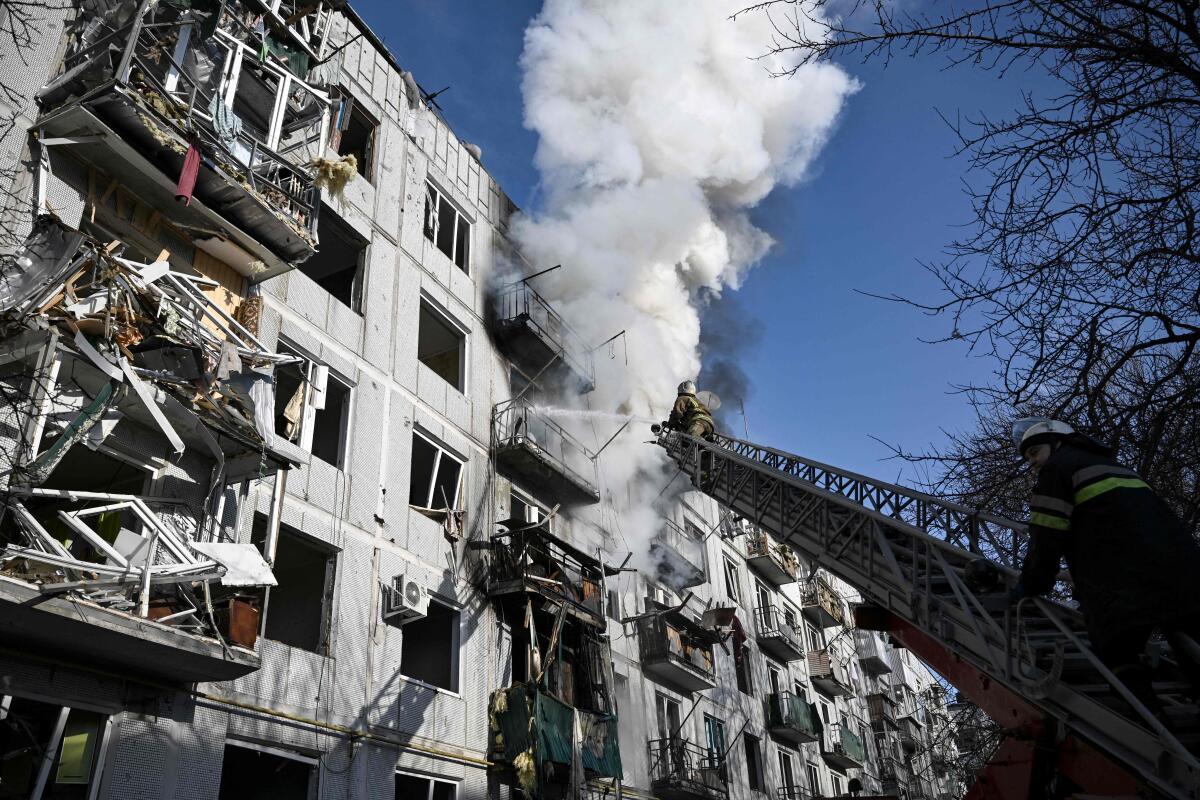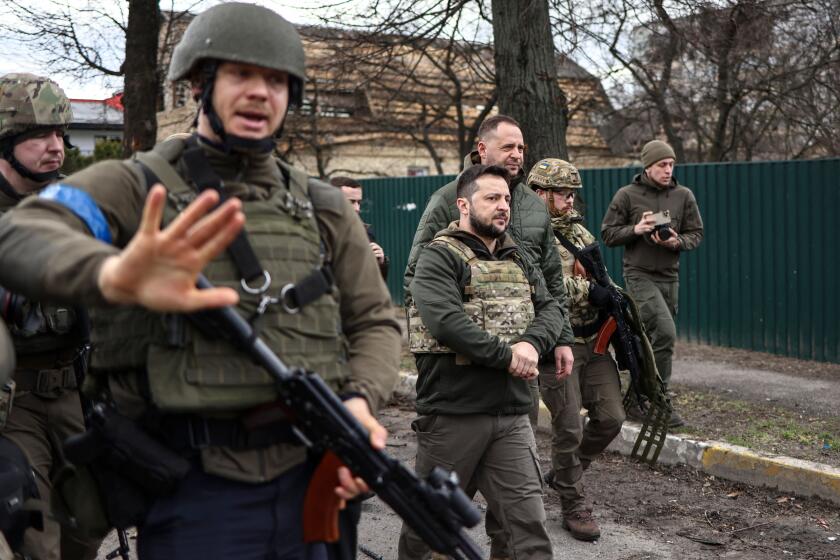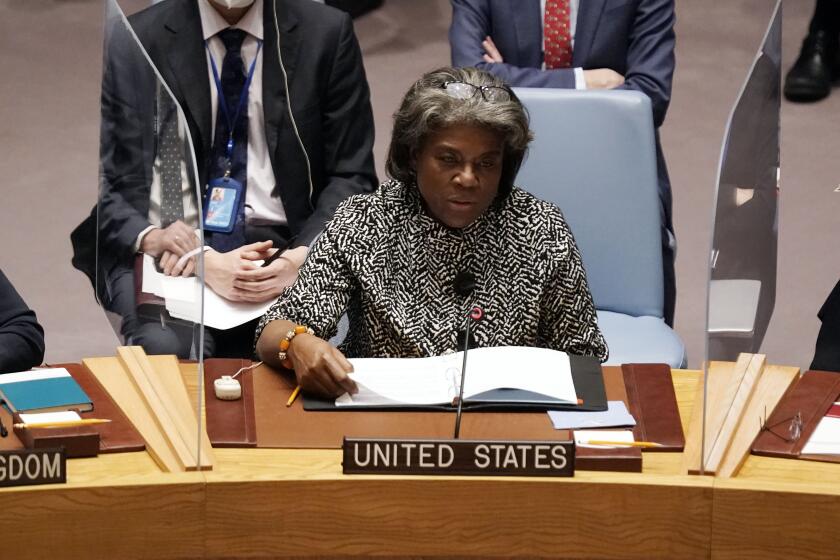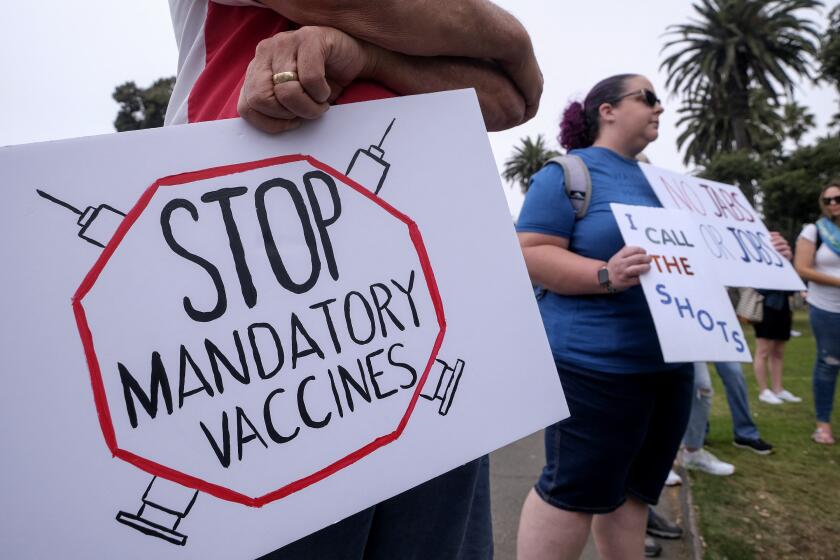Ukrainians take stand against Russians in Kyiv: ‘This night they will storm’

- Share via
KYIV, Ukraine — Russian troops closed in on this besieged capital on Friday as sirens wailed, missiles streaked through the night and civilians took up arms to save a city on the brink of defeat in the largest ground war in Europe since World War II.
“Make Molotov cocktails, neutralize the occupier!” the Ukrainian Border Guard implored as tens of thousands of men and women around the country loaded rifles, assembled homemade bombs and joined ragtag militias in an effort to beat back one of the world’s most powerful armies.
The battle for Kyiv unfolded into a second night — gunfire crackled throughout the city into Saturday morning — as the United States and the European Union imposed some of their harshest sanctions yet against Russia and as NATO, the transatlantic military alliance, deployed more troops to its member states in Eastern Europe.
A woman reacts as she stands in front of a house burning after being shelled in the city of Irpin.
Despite an assessment from top Pentagon officials that Russia’s invasion was not advancing as quickly as expected thanks in part to a spirited defense by Ukraine’s air force, military and civilian deaths were mounting and tens of thousands of people were fleeing. As Russian tanks surrounded the capital, an uneasy realization settled in: Despite widespread global outrage over Russia’s invasion of a democratic nation, no foreign armies were coming to help.
“We are defending our country alone,” Ukrainian President Volodymyr Zelensky said in a solemn video address in which he ordered men of fighting age to stay in the country and arm a resistance.
He said he would remain in Kyiv and warned that multiple cities were under attack: “This night they will storm.”
In the less than 72 hours since the onslaught began, Ukraine has been jolted from a peaceful, modern nation of domed churches and lively bars into one filled with scenes that recall the wars of Europe’s past.
As newly minted fighters dug trenches and practiced loading weapons, people clutching battered suitcases and passports swarmed buses and trains to take them to safety in Romania and Poland. Families cowered in subway shelters. Fragments of downed aircraft smoked amid brick homes and across open fields. Soldiers lay dead in fresh snow.
On a call with President Biden on Friday that lasted nearly 40 minutes, Zelensky pleaded for more help. Shortly after, the U.S. announced new economic sanctions, this time directly targeting Russian President Vladimir Putin as well as a $10-billion Kremlin-run investment fund.
It was the latest in a series of punishing sanctions imposed by Western powers in recent days, part of what British Prime Minister Boris Johnson called “a remorseless mission to squeeze Russia from the global economy piece by piece.”
But it was not enough for a nation on the edge of being conquered. Zelensky said he was grateful for the support, but he has repeatedly slammed sanctions levied against Russia as insufficient, warning that unless world leaders do more to stop the invasion, Putin would broaden his war.
“If you don’t help us now, if you fail to offer a powerful assistance to Ukraine, tomorrow the war will knock on your door,” said Zelensky, a former comedic actor who has transformed, overnight, into a wartime leader of mercurial energy and partisan eloquence. He called on citizens from other nations with combat experience to come to Ukraine “and protect Europe with us.”
“The fate of Ukraine is being decided right now,” he said.
On the second day of its large-scale assault on Ukraine — part of Putin’s dream of stitching back together remnants of the former Soviet Union — the Kremlin sent mixed messages about whether it was open to dialogue with Ukraine.
Russian Foreign Minister Sergei Lavrov said Moscow was ready for talks once the Ukrainian army laid down arms, insisting that Russia does not intend “to oppress” the Ukrainian people and saying they should have “a chance to decide their future.”
But Putin was much less diplomatic at a meeting with members of his security council, where he said he did not expect to reach agreements with “a gang of drug addicts and neo-Nazis that have settled in Kyiv and taken the entire Ukrainian people hostage.”
Zelensky, who has repeatedly said that he would not accept a Ukraine under Russia’s thumb, has offered to negotiate on one of the Kremlin’s key demands: that Ukraine declare itself neutral and abandon its ambition of joining NATO. The goal of membership in the military alliance is enshrined in Ukraine’s constitution.
Russia’s offer of dialogue led some to question whether it was struggling militarily — or whether it was an attempt at psychological warfare in step with Putin’s tauntingly slow buildup of tens of thousands of troops along Ukraine’s borders in recent months.
U.S. military officials said there was evidence that Russia’s attack on Ukraine, a nation the size of Texas with a population of 44 million, had not gone entirely according to plan.
Pentagon officials said they believed the Russians had lost momentum, noting that Ukraine’s air force was still fighting and its communications and media systems remained intact.
“It’s not apparent to us that the Russians over the last 24 hours have been able to execute their plans as they deemed that they would,” said Pentagon Press Secretary John F. Kirby, although he added that it was a “dynamic, fluid situation.”
Pentagon officials said about one-third of the roughly 190,000 troops that Russia assembled before the invasion are now in Ukraine, and said Russia was conducting an amphibious assault west of Mariupol, on the Sea of Azov, involving potentially thousands of troops. The Russian military said it laid claim Friday to the southern Ukraine city of Melitopol, about three hours to the west.
In the meantime, Russian troops continued their assault in other parts of Ukraine, hitting electrical grids and strategic military sites but also civilian targets, such as a hospital and a school.
At the U.N. Security Council, Russia vetoed the resolution condemning its Ukraine invasion, but the Biden administration is vowing to take the measure before the full United Nations.
In a Kyiv apartment building, residents woke Friday to plumes of smoke and screaming — the result, according to the city’s mayor, of Russian shelling.
“What are you doing? What is this?” asked a dazed survivor, Yurii Zhyhanov, according to the Associated Press. As tens of thousands of his compatriots have already done, he quickly gathered his belongings to try to flee the city with his mother.
“The enemy wants to bring the capital and us to our knees,” said Kyiv Mayor Vitali Klitschko.
A former heavyweight boxing champion who was known as Dr. Ironfist in his fighting days, Klitschko said he was prepared to defend Kyiv as a soldier. “I believe in Ukraine, I believe in my country and I believe in my people,” he said.
Authorities said that about 18,000 guns had been distributed to reserve fighters in Kyiv, a city of nearly 3 million people that was the site of pro-democracy protests in 2014 that led to the ouster of a Kremlin-friendly president and helped spark the current conflict.
At the time, Putin responded to those protests by annexing the Crimean peninsula in southern Ukraine and fomenting a separatist rebellion in Ukraine’s east, which seized control of part of the Donbas region. He has described his invasion of Ukraine as retribution for what he falsely describes as an anti-Russian genocide in Donbas.
The same revolutionary spirit that ignited protests in Kyiv nearly a decade ago has been prevalent in recent days as citizens — laborers, teachers and shopkeepers — lined up to join what are known here as “territorial defense” battalions.
Ukrainian Prime Minister Denys Shmyhal said tens of thousands of people had already registered with the militias, and pleaded for more to join them and “stand up against terror.”
“Help the military, help the volunteers, help the doctors,” he urged.
As night fell Friday, all eyes were on Kyiv, a city that dates back more than 1,500 years and where just days ago restaurants were packed with locals unwilling to let the prospect of a Russian blitz blunt their moment of good cheer.
As air raid sirens echoed through the empty streets, their wail floating above the irregular thump-thump of explosions in the distance, no one knew what dawn would bring.
Russia’s military said it had seized a strategic airport near Kyiv and said it had already cut off the city from the west — the direction in which many of those escaping the invasion were heading.
United Nations officials reported at least 25 civilian deaths, and said that about 100,000 people had fled their homes. The U.N. has warned that as many as 4 million Ukrainians could abandon the country if the fighting escalates, a refugee crisis not seen in Europe since 2015, when millions arrived after escaping the Syrian civil war.
Ukrainian Deputy Defense Minister Hanna Malyar said Friday that the Russian army had lost up to 80 tanks, hundreds of armored combat vehicles, 10 warplanes and seven helicopters. The figures could not be independently verified, and Moscow did not issue a tally of losses.
In Russia and the U.S., a Kremlin-backed propaganda effort seeks to build support for — or at least muddy the waters around — Putin’s invasion of Ukraine.
The pyrotechnics over Kyiv were largely absent in Kharkiv, Ukraine’s second-most populous city.
Friday morning, residents had cautiously emerged from the underground subway stations where they had taken shelter, making their way along mostly empty streets amid a snowstorm. Even the buses were still running.
It wasn’t until slightly before noon that the sounds of explosions reverberated through the city center, sending pedestrians scurrying for shelter while motorists attempted to escape from a threat they could hear but could not see.
One of the last remaining staff members at a hotel in Kharkiv said he intended to stay. Alexander, a 24-year-old waiter who declined to give his last name, seemed resigned to the Russian invasion to come.
“Why would I go?” he said. “This is my country. America isn’t here. The European Union isn’t here. So we’re fighting on our own.”
Bulos reported from Ukraine and Linthicum from Mexico City. Times staff writers Eli Stokols, Sarah D. Wire and Anumita Kaur in Washington contributed to this report.
More to Read
Sign up for Essential California
The most important California stories and recommendations in your inbox every morning.
You may occasionally receive promotional content from the Los Angeles Times.













